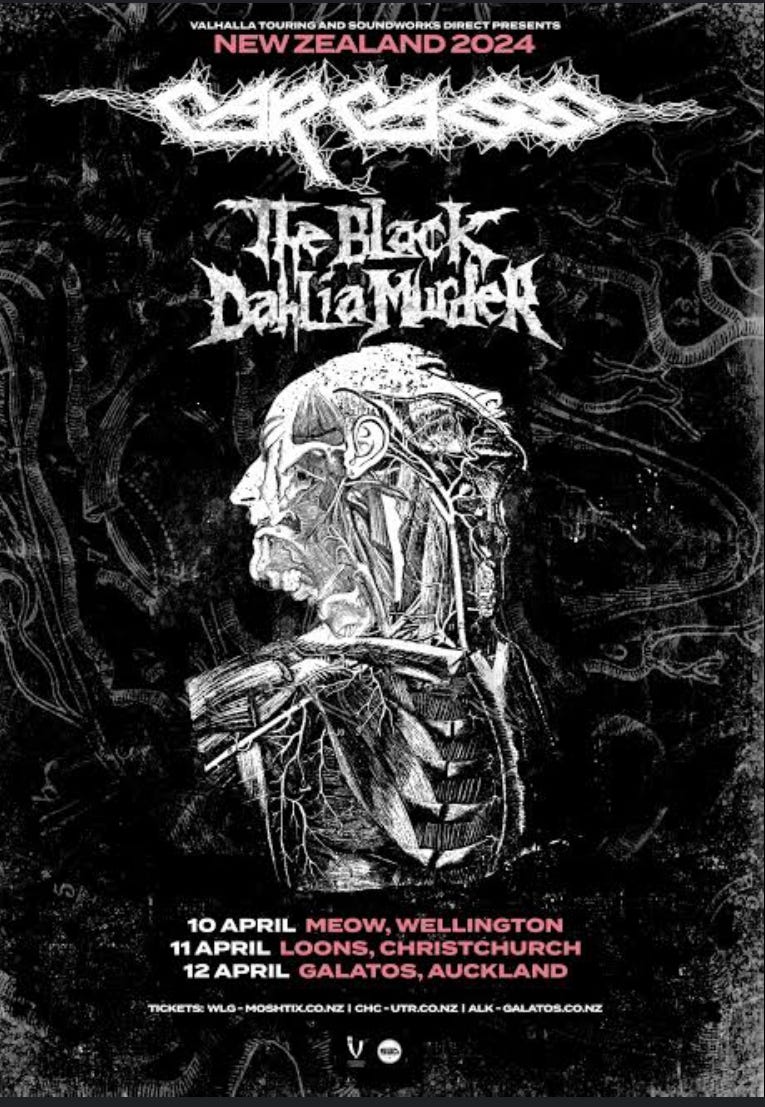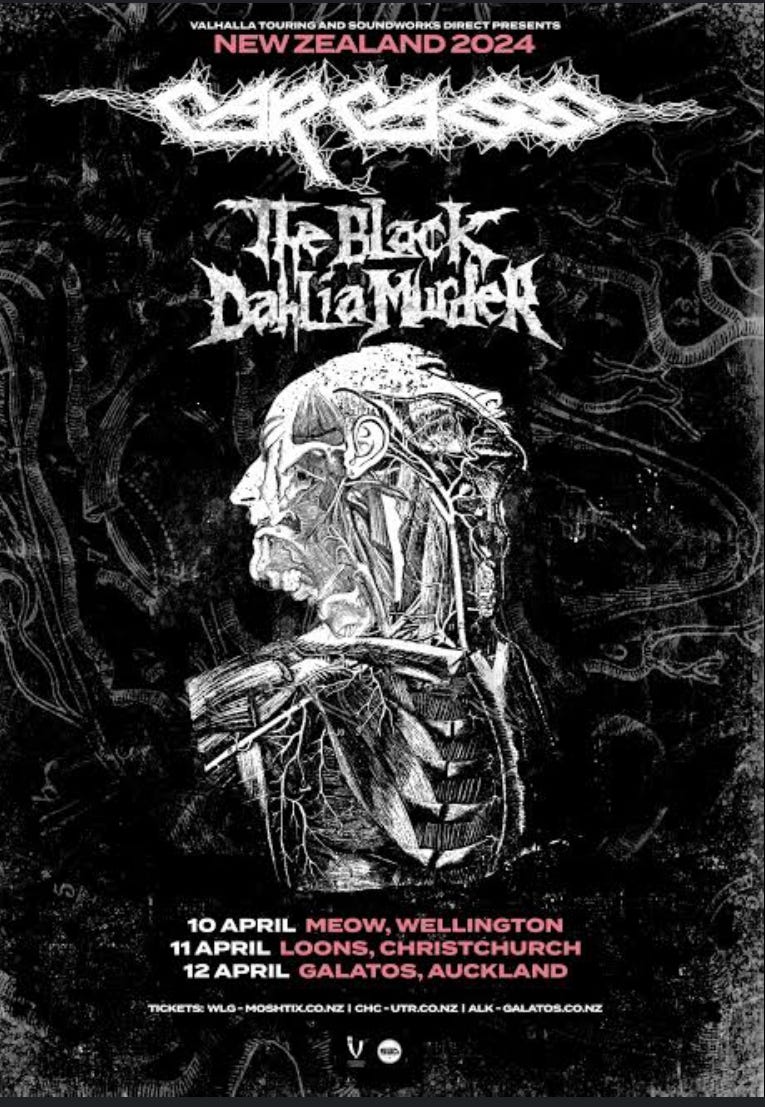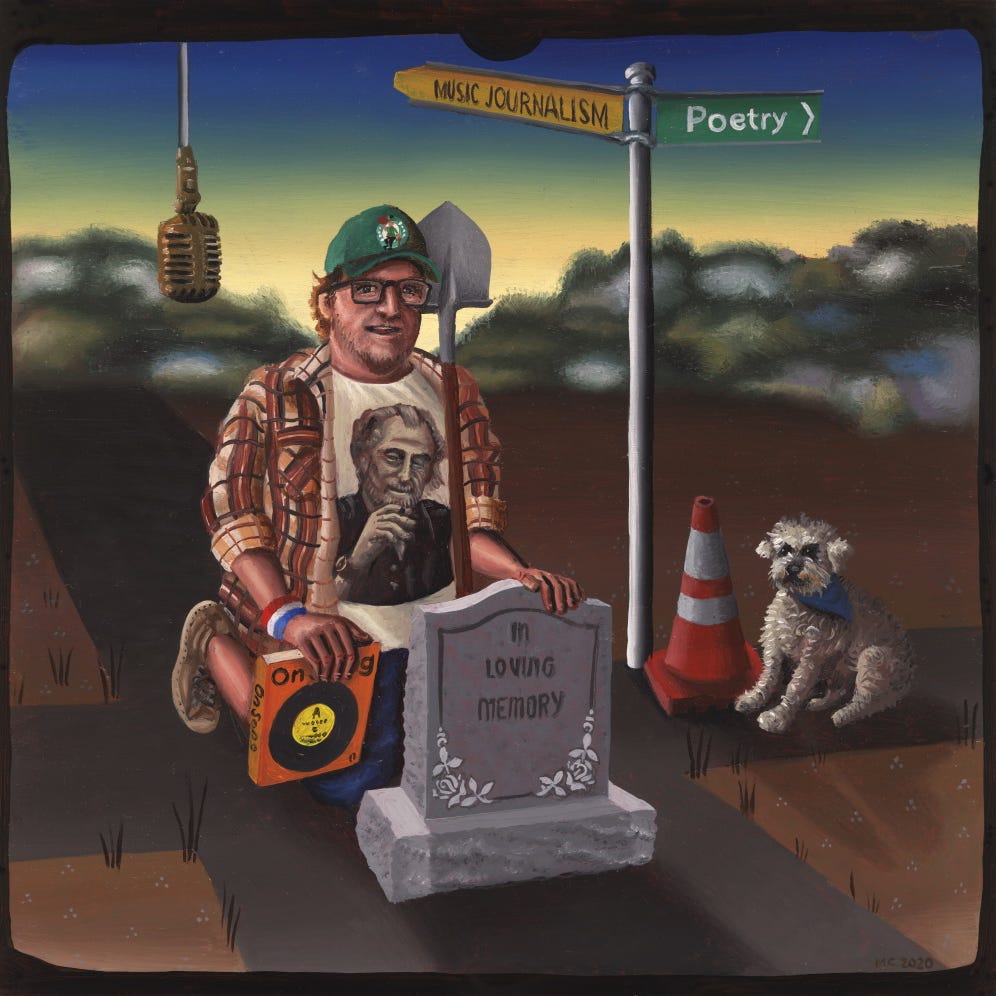Gig Review: Metal on Metal with The Black Dahlia Murder and Carcass, Great Bands, Great Energy, Great Audience
I like to review gigs, and feel like it should be a thing again. So I’m doing my best. As often as I can. The Black Dahlia Murder and Carcass both delivered. In spades. Ace!
Carcass & The Black Dahlia Murder
Meow, Wellington
Wednesday, April 10
The Black Dahlia Murder has been through some line-up changes, most brutally, the 2022 death of their former lead singer. It’s explained away, early on, by new lead singer (but founding member and lead songwriter), Brian Eschbach. He says it’s good to be back in Wellington, and then points to the fact that it’s a different line-up, he’s masterful at keeping the energy high and there’s almost a little humour in his banter, without it ever falling over into the absurd. There’s also the requisite amount of respect. The fans know they’re lucky to have the band (still) in any configuration. He’s comfortable without his guitar, leaving the twin axe duties to Brandon Ellis, and Ryan Knight — now back in the fold.
The Black Dahlia Murder, a Detroit, Michigan death metal band with melodic edges, formed in 2001. They favour the galloping horses double-pedal drumming and, yes, there are cameo vocal appearances from Cookie Monster, as always, but there’s something more to this band than just the obvious ‘death’ genre framing. Spicy guitar solos burst from the seams of their songs, hints of Slash and Eddie and Zakk and Kirk sit within Ellis’ style, Knight is a crucial rhythm player, adding leads, sometimes twinning with Ellis — and there are shades of classic NWOBHM influences here — but crucially never getting lost in a jackhammer sound by doubling with the drums and bass. The Black Dahlia likes a riff but never feels hemmed in by it, never feels the need to relentlessly restate it, instead their songs have a fluidity, and their technical precision is flawless. So we get short, sharp blasts of death metal that never feel corny, nor ham fisted; the band dazzling in its execution. Exploration a part of every tune.
They open with Verminous‘ title track, but move freely across the catalogue, taking in highlights from most of their albums, with this version of the band effortlessly bridging the chasm. For example, Everything Went Black from 2007’s Nocturnal and Nightbringers’ title track (from 2017) feel like arm-around-shoulder brothers back to back as midset highlights, not the slightest hint that a decade separates their creation.
Eshbach was expert at keeping the energy up, at being ever so slightly self-effacing without ever lunging toward parody, and the band never put a foot wrong, nor a finger anywhere near the wrong fret. I sometimes think we’re so lucky to have these visiting metal bands, and we’re a good audience for them. We care. And we know they do. This might be the genre’s best aspect — for any thoughts of intimidation or confrontation from anyone looking in from the outside, it’s an inclusive genre and its fans and bands understand the symbiotic relationship. Each cares for the other and knows they’re there for one another. And we get to see these heavily practiced, disciplined musicians perform something close to a clinic. The Black Dahlia Murder was flawless in its execution, the only slight niggle was the sound mix in the venue — eventually it came close to feeling fine, but to begin with I thought the generator was being powered by a fucking slotcar set or something.
This idea of “melodic” death metal was arguably pioneered by Liverpool’s Carcass. They formed in 1985, started releasing material in the late 1980s and then really took shape with 1993’s classic Heartwork. It’s an anchor for this evening’s setlist, providing several highlights, including the set-opening, Buried Dreams, the first of several times we’ll get to hear guitarist Bill Steer’s Tony Iommi-influenced soloing. They’ll return to the album for structural pillars throughout the night, including the mid-set highlights of This Mortal Coil and Death Certificate, and, near the end of the gig, the title track is utterly sublime.
But there’s material from across the catalogue — and all of it is so well served, particularly because the band’s drummer for the last decade, Daniel Wilding, is the best example of how truly great drummers elevate any band. Carcass was going to be good anyway, but they’re phenomenal largely because of Wilding. He is like a heavy metal Keith Moon when he attaches himself to a groove. He’s like Ian Paice, in that deep down underneath what he is doing, you feel the bedrock of a foundational rock’n’roll groove. This platform allows lead singer and bassist Jeff Walker the freedom to play if not fast then certainly loose with the truth of the bass role. He’s almost Derek Smalls at times with his aerial swiping, but he’s impeccable rather than comical. His energy is perfect. And his voice is great. He growls and snarls and serves this inherently silly music up so perfectly seriously, so delightfully packed with a joy and commitment that belies any actual meaning.
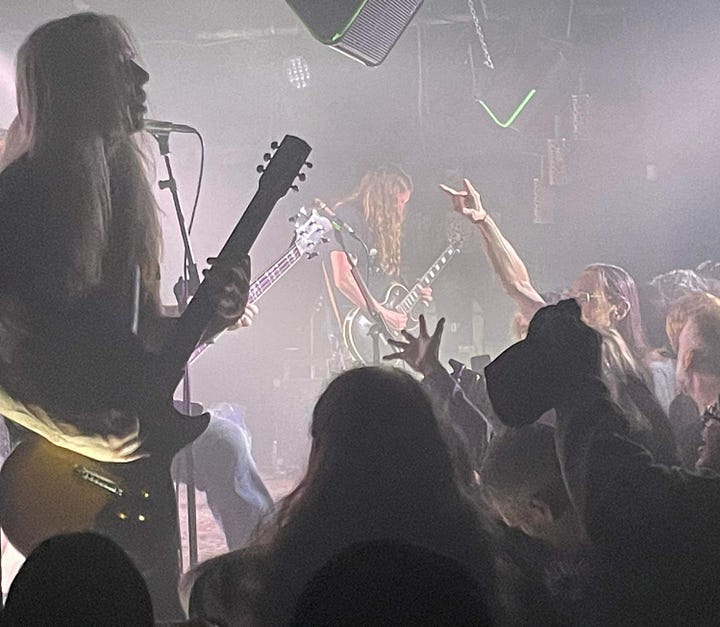
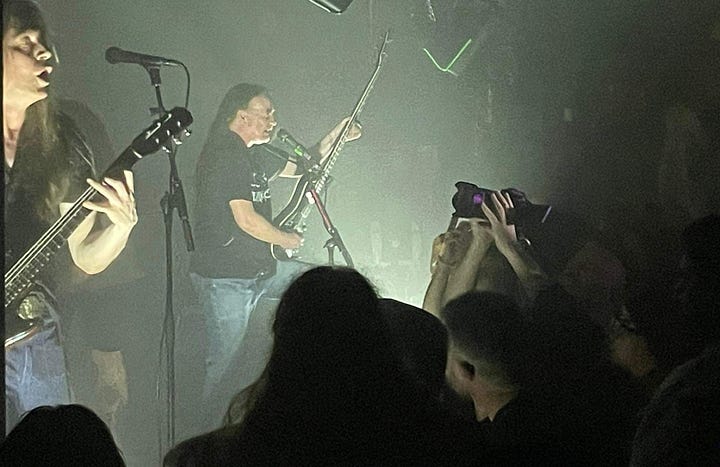
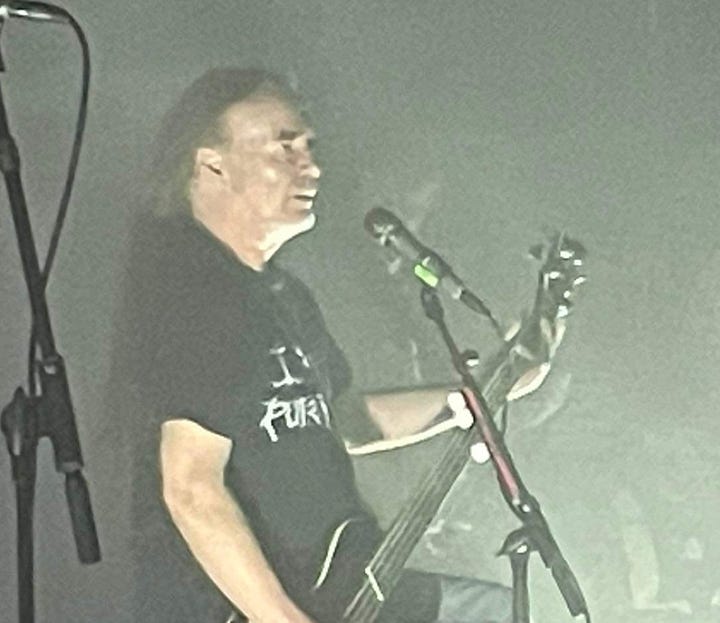
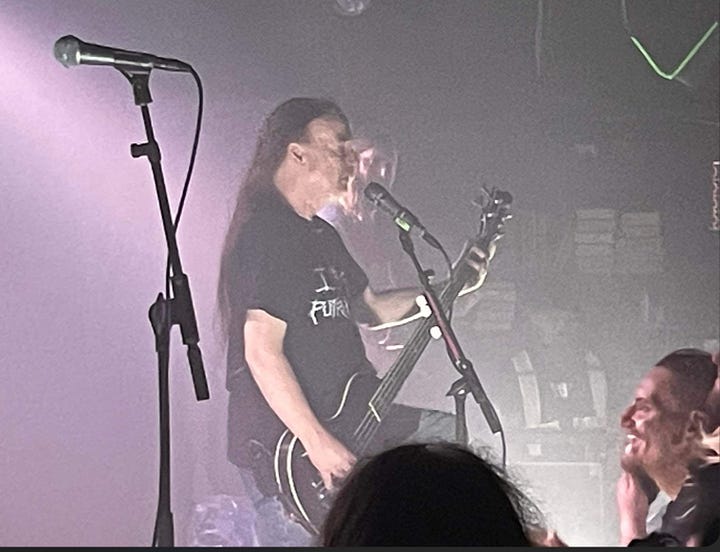
Carcass feels like classic metal (Incarnated Solvent Abuse) and the newest material (Under The Scalpel Blade) mixes in perfectly with the back-catalogue gems (Tomorrow Belongs To Nobody). And at no point in the set is there anything resembling a lull. Walker taking time out to provide the front rows with water, again this communicated respect and duty of care, band aware of its fans on a level that is not present in a lot of other genres. The bands themselves are fans — they know the thrill, and the physicality of committing to being up front and in the pit and feasting on the collective hum of it all.
Keep On Rotting In The Free World was one of so many songs that felt on point, execution-wise, but also added a little political edge to the evening. But this was about the enjoyment of great metal music. And this was about the skill of these players. And this was about how lucky we are — in our still relatively free world here in New Zealand — to be allowed the chance to see such things, to feel them; to truly experience them.
Shades of early Thin Lizzy, in the way the guitars shaped the songs and wound around one another without ever getting stuck, hints of the thrash and grindcore elements too, bits of Slayer and Napalm Death in there, but also just classic, high octane rock’n’roll eh!
Sound issues sorted, and early, this became one hell of a night to remember. Both bands digging deep into the history of their sounds, serving up the memorable moments, both adhering to the conventions within the genre, but never feeling stale, never riding the worst elements (monotony) around the park; both finding new hidey-holes for fresh ideas within a genre that could so easily sit stale. I so loved this gig. I had high enough hopes going in, but both bands knocked it out of the park in a way I couldn’t quite have expected. You can never ask for more than that. Right?




